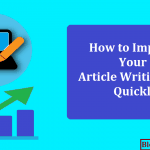Getting your content to main a level of quality doesn’t just mean writing great content but also maintaining it.
Whether you’re writing your own content or have a guest blogger or writer writing for you, you should be capable of editing it to a decent degree.
The problem that a lot of new sites and blogs face is that their written content is interesting and engaging but lacks quality control.
This leaves readers to feel like they’re reading inferior content even if that isn’t the case.
In order for your content to be viewed as having some sort of quality, you have to keep a watchful eye on it.
Today we’re going to be looking at some ways you can edit your content better.
This will not only make it seem more likeable but will also give your site a certain sense of professionalism.
Contents In Page
How to Become a Better Editor
When people think of editors, they think of highly experienced professionals working in publishing houses. But in reality, just about anyone can become an editor.
All it takes is a keen eye and a will to commit to making better content.
However, there is a difference between an editor and a good editor.
Being a good editor means putting in the effort in and taking care to manage the content in a proper way.
Here are some basic tips that should help you become a better editor.
1. Spot Blatant Mistakes
There’s nothing worse than an editor that isn’t capable of spotting clear mistakes and blunders in the content.
However, even experienced editors can sometimes overlook critical errors.
This is common especially when there is a large workload to sift through – we’re only human after all.
This is why it’s important to make sure that you carefully spot mistakes like grammatical errors, punctuation, and formatting right from the get go.
It’s one of the easiest steps of editing but can also be the most important. Make sure to double and triple check the content for basic mistakes before you move any further.
2. Place Close Attention to the Requirements
Every post and article has its own set of requirements. For some posts this is very apparent and for others it isn’t explicitly stated but rather implied.
As an editor, it’s your job to study these requirements carefully and make sure the content adheres to them properly.
This is an aspect that requires you to take certain ordered steps in order to ensure everything is being followed.
The first step is to recognize the specific requirements of the content and relaying them to the writer (or yourself if you’re the one writing).
After that you have to follow up after the content is written to make sure the final product is compliant with the requirements.
3. Make Sure Proper Formatting is maintained
Written content is all about formatting.
Whether you’re writing an academic article or an informal blog post, it’s a crucial aspect of presentation.
It’s incredibly easy for a well written post to be wrecked by improper formatting. It falls on you as an editor to make sure the formatting is done properly.
This is different for every post, so you need to study the content properly before you can decide what kind of formatting it needs.
If there are supplementary elements like pictures, videos, audio files, or links they need to be properly integrated around the content without sticking out too much.
4. Look for Verbal Efficiency
Writing is an extension of our thoughts in the same way speech is.
This is why readers expect to read content that sounds like an actual conversation they would have with the writer.
A big part of editing is look at how the content sounds when it’s being read.
If there are too many words and sentences being used to describe something simple, it can seem unrealistic.
At the same time, if there are too few words it can make it seem like writer isn’t interested in sharing their thoughts.
Finding the right balance is tricky but highly essential for good content that reads well.
The best way to do this is to read everything out loud and see how it actually sounds.
5. Proof Read Everything
No editor is going to be able to spot everything in one go.
It’s very easy to overlook mistakes in the content without even realising it.
It’s crucial that you pay the proper amount of attention to the content you’re editing in order to maintain it better.
Make sure that you accurately proof read everything from start to finish several times.
When proof you’re proof reading try to focus on every sentence individually, so you can check if you missed something hiding in plain sight.
This will go a long way into improving your ability in spotting mistakes in the future.
6. Read Work from Other Sources
No one is born with skills, we all learn by observing, following, and executing what we see around us.
When you’re an editor, you need to be able to develop your sense of what a good piece of work looks like.
This can only be done by looking at other posts and be observational about what of editing is being employed.
Always strive to look at high quality content as it will develop a good sense of standards that you can uphold.
It will also give you some goals about how you want your content to reach those levels of quality.
Try to research work that’s related to your topic and get an idea of how everyone else does it.
This will help mould you into a better editor and keep you on the right path with your content.
Conclusion:
Great content is the result of great writing and great editing. One can never exist without the other which is why being a good editor is equally important.
By following the tips above, you can become the editor that you’ve always imagined yourself to be.








